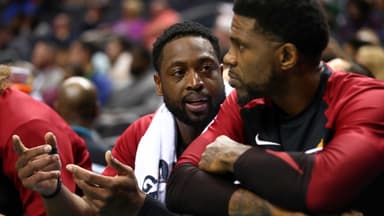An icon for the city of Philadelphia, Allen Iverson stood among the best in the NBA during his initial 10 years with the Philadelphia 76ers. But even with his talent, going to the Denver Nuggets after a decade with one team never seemed like it was going to be an easy transition. So, why did AI ever choose to leave?
Advertisement
Making an appearance on an episode of the Knuckleheads podcast, Allen Iverson took a stroll down memory lane, talking about his illustrious career and some of his favorite moments and highlights he’s had over the years.
During the conversation, co-host and former NBA player, Quentin Richardson popped the question of how the transition from the Philadelphia 76ers to the Denver Nuggets was for ‘The Answer’. In response, he said,
“It wasn’t hard at all because I didn’t like what was going on. I think we had lost like 20-something games in a row, something crazy. And I kept trying to get them to change what we were trying to do.
Iverson then expounded upon just how much he did to try and change things at the franchise.
I talked to the ownership and I was just like, ‘Look man, if we gon’ do this…I’m at the end of my career. I’ve been here 10 years…I don’t wanna lose now…My hourglass is running out.’ I’m like, ‘Man, if this is what we gon’ do, y’all might as well let me go.’”
When asked about the scenario in Denver, Allen Iverson was all praises about his new teammates and the environment that the Nuggets had created. The 76ers legend even spoke very highly of Carmelo Anthony, deeming him to be the most talented player he had ever shared a locker room with.
The conditions under which Iverson left the Philadelphia 76ers were unfortunate, to say the least, especially after he spent an entire decade with the team. However, it does appear that he eventually got the kind of team he wanted, while the 76ers were finally able to commit completely to a rebuild.
That said, while A.I. got what he wanted, how did things shake out for the rest of his NBA tenure?
The latter half of Allen Iverson’s NBA career
Allen Iverson’s final year during his first stint with the Philadelphia 76ers may just have been his greatest, as he averaged a career-high 33.0 points, to go along with a career-high in assists with 7.9 dimes per game.
After he got to Denver, his scoring numbers took a slight hit. But the depreciating point production wasn’t a sign of AI losing a step. Instead, it was simply a product of the player finally having teammates he could lean on to generate the team’s offense, something that also resulted in the team winning quite a few games.
Dear Kobe: From Allen Iverson pic.twitter.com/G0rikRrEnU
— Brandon (@clickthatfollow) February 29, 2024
His two seasons with Denver were seen as a massive success by many. However, Denver’s coaching staff just didn’t feel the same way. Consequently, Iverson was traded to the Memphis Grizzlies ahead of what would’ve been his third year in Denver.
This is when fans finally started to see the decline of AI’s play, which also resulted in him soon being traded to the Detroit Pistons. Eventually, he made his way back to the Philadelphia 76ers, before he retired as a legend in ‘The City of Brotherly Love’.





